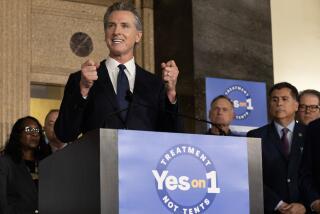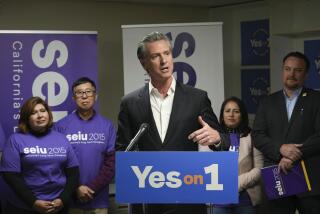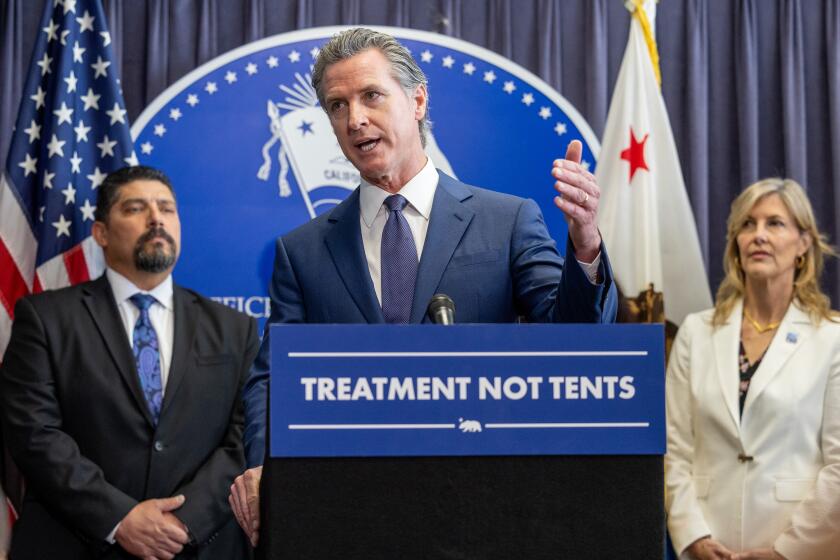Electoral vote measure fails to make June ballot
Veteran political writers Don Frederick and Andrew Malcolm offer irreverent takes on the 2008 campaign.
•
A proposed initiative that drew national attention for its potential to affect next year’s presidential election will not appear on the June ballot, organizers said Thursday.
Republican backers of the measure, which could have tilted the presidential contest toward the GOP nominee by changing how California awards electoral votes, conceded that they were unable to raise sufficient funds.
Sacramento consultant Dave Gilliard, the campaign manager, said that even if a financial angel were to shower the campaign with $1 million, there was not enough time to qualify the measure for June.
“I was surprised that more people that finance these types of efforts didn’t step forward,” Gilliard said. “We had strong supporters and good supporters but didn’t come anywhere close to making the budget.”
Deadlines passed last week for submitting petitions to elections officials, who would have determined whether supporters had gathered the necessary 434,000 signatures of registered voters. Typically, gathering enough signatures costs about $2 million; organizers must overshoot their mark to allow for invalid names.
Gilliard said proponents were holding out hope that the measure could appear on the November ballot with the presidential contest. But he said that was a dicey scenario: Even if it is on that ballot and wins voter approval, it might not affect the 2008 election.
The initiative might not kick in until 2012, Gilliard said -- adding that courts likely would decide the matter.
The proposal would replace California’s winner-takes-all system of appropriating its 55 electoral votes, awarding the votes instead by which candidate wins individual congressional districts.
Republicans hold 19 congressional seats in California, suggesting the GOP presidential candidate could win at least 19 electors here -- almost the equivalent of Ohio’s.
Democratic National Party Chairman Howard Dean has said Democrats could not win the White House without capturing all of California’s electoral votes, which are more than 10% of the 538 electoral votes nationally and the biggest block of any state.
Although confident they could have defeated it, Democrats said they were relieved that the measure would not appear in June.
“This effort to rig the presidential elections demonstrates that the Republicans . . . recognize that they will be a minority party if they lose the White House and will do everything they can to hold on to power,” said Democrat Chris Lehane, who helped organize the opposition.
He said Democrats plan to push alternative proposals in various states that would bypass the Electoral College altogether and elect presidents by a national popular vote.
The Electoral College measure first ran into trouble in October when the original proponent, Sacramento attorney Tom Hiltachk, abandoned the campaign. He and his team raised only $175,000. After Hiltachk dropped the measure, Gilliard took it up, vowing to raise $2 million and enlisting the support of Rep. Darrell Issa (R-Vista), a longtime client.
Issa donated $100,000, the California Republican Party gave $150,000, and the Lincoln Club of Orange County, an organization of Republican contributors, chipped in $75,000. Several other Republican stalwarts gave four- and five-figure checks. But donations totaled about $1.3 million, well short of the mark.
“Raising money is proving to be a lot more difficult than was anticipated,” Gilliard said.
Republican Gov. Arnold Schwarzenegger had expressed skepticism about the measure. And Democrats had mounted an aggressive effort to block it, filing a complaint with the Federal Election Commission alleging that backers of Republican candidate Rudolph Giuliani violated federal regulations by supporting the proposal.
New York hedge fund owner Paul E. Singer, one of Giuliani’s largest fundraisers, had seeded the initiative with the original $175,000 donation.
The Electoral College initiative is relatively simple. Backers had portrayed it as a way to make California’s elections fair. Democrats denounced it as an attempt to steal the 2008 presidential election.
By altering the California Elections Code to require that electoral votes be counted by congressional district, California would have joined just two other states, Maine and Nebraska, which have a combined nine electoral votes.
More to Read
Start your day right
Sign up for Essential California for news, features and recommendations from the L.A. Times and beyond in your inbox six days a week.
You may occasionally receive promotional content from the Los Angeles Times.






